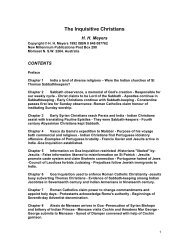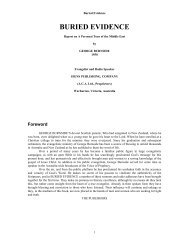Battle of the Bibles - Present Truth
Battle of the Bibles - Present Truth
Battle of the Bibles - Present Truth
Create successful ePaper yourself
Turn your PDF publications into a flip-book with our unique Google optimized e-Paper software.
attacked and destroyed monasteries and o<strong>the</strong>r religious houses. "Burn <strong>the</strong> nests and <strong>the</strong><br />
rooks will fly, " cried Knox (ibid p 302).<br />
When eventually he went <strong>the</strong> way <strong>of</strong> all flesh and rested beneath his epitaph, all<br />
would agree with <strong>the</strong> truth written <strong>the</strong>re "Here lies one who never feared <strong>the</strong> face <strong>of</strong><br />
man".<br />
The tide <strong>of</strong> opinion quickly turned against <strong>the</strong> popish -controlled government, a<br />
circumstance which soon neutralised any threat to England and resulted in imprisonment<br />
for <strong>the</strong> Scottish Queen. With both England and Scotland now well on <strong>the</strong> way to<br />
becoming Protestant countries, <strong>the</strong>y, for <strong>the</strong> first time had a common bond which would<br />
eventually bring about that political union which we know today as Great Britain.<br />
But, just as importantly, with this union <strong>the</strong>re arose a Protestant alliance which<br />
was to flourish throughout <strong>the</strong> British Empire. When <strong>the</strong> Empire lost its colonies in North<br />
America, <strong>the</strong> Protestant bond not only remained, but streng<strong>the</strong>ned. Within this alliance,<br />
<strong>the</strong>re arose <strong>the</strong> great Bible Societies which propelled <strong>the</strong> Protestant <strong>Bibles</strong> to <strong>the</strong><br />
uttermost parts <strong>of</strong> <strong>the</strong> world.<br />
Chapter Six<br />
The Council <strong>of</strong> Trent<br />
We have noted <strong>the</strong> great influence which <strong>the</strong> Reformation in Europe was having<br />
on England and Scotland in particular; and it was to Protestant areas <strong>of</strong> Europe that<br />
many a persecuted Reformer fled for safety and succour.<br />
At <strong>the</strong> time <strong>of</strong> John Knox's return to Scotland, Geneva had become a busy centre<br />
for Bible translation. Calvin, a relative <strong>of</strong> <strong>the</strong> Waldensian, Olivetan, who translated <strong>the</strong><br />
New Testament into <strong>the</strong> French language, had edited a second edition <strong>of</strong> his Bible. This<br />
Waldensian Bible <strong>the</strong>n became <strong>the</strong> basis <strong>of</strong> an English-language Bible which came to be<br />
known as <strong>the</strong> Geneva Bible because it was translated in Geneva. For <strong>the</strong> first time, a<br />
complete English Bible was divided into verses.<br />
By 1560, this Geneva Bible was being enthusiastically adopted by Protestant<br />
England and Scotland where it was to remain <strong>the</strong> leading version until it was finally<br />
superseded by <strong>the</strong> King James Version <strong>of</strong> 1611.<br />
It was this line <strong>of</strong> <strong>Bibles</strong> which came to be known as <strong>the</strong> Received Text. This line,<br />
preserved during <strong>the</strong> Dark Ages by <strong>the</strong> churches <strong>of</strong> <strong>the</strong> wilderness, inspired <strong>the</strong><br />
Reformation and resulted in catastrophe for Roman Catholicism.<br />
Rome could not let <strong>the</strong> use <strong>of</strong> <strong>the</strong> Protestant Bible, with its religious and political<br />
consequences, go unchallenged. In 1545 <strong>the</strong> Vatican assembled a council <strong>of</strong> war<br />
against <strong>the</strong> Reformation. Known as <strong>the</strong> Council <strong>of</strong> Trent, it was prolonged until <strong>the</strong> year<br />
1563.<br />
Very early in its deliberations, <strong>the</strong> Council was seen to give recognition to, and<br />
allow itself to be dominated by, a recently-formed sect <strong>of</strong> <strong>the</strong> Roman Catholic Church<br />
known as <strong>the</strong> Society <strong>of</strong> Jesus, whose members are commonly referred to as Jesuits.<br />
Their principal founder, Ignatius Lyola, is described in Collin's Dictionary as "a crafty<br />
person, an intriguer (an opprobrious use <strong>of</strong> <strong>the</strong> word)" while Jesuitism is defined as: "<strong>the</strong><br />
principles and practices <strong>of</strong> <strong>the</strong> Jesuits; cunning deceit; deceptive practices to effect a<br />
purpose". The perceived aim <strong>of</strong> <strong>the</strong> Society is to protect Roman Catholicism by<br />
destroying Protestantism.<br />
When we consider Protestantism's forceful and consistent denunciations <strong>of</strong><br />
Romanism in those times, its gross immorality, its intrigue and false religion, it would be<br />
expected that meeting <strong>the</strong>se charges would be high on <strong>the</strong> Council's list <strong>of</strong> priorities. But<br />
this was not <strong>the</strong> case.<br />
8





